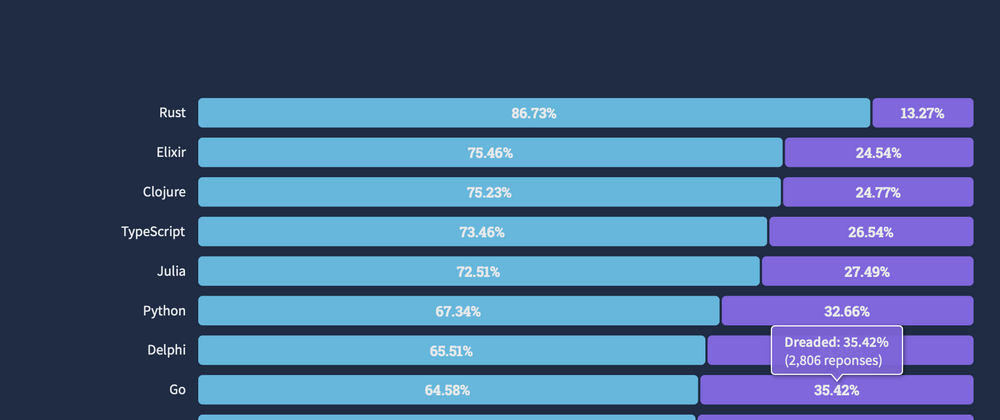It should come as no surprise to those following the growth and expansion of the Julia Programming Language ecosystem that in this year's Stack Overflow developer survey, Julia ranked in the top 5 for the most loved languages (above Python - 6th, MatLab - Last, and R - 33rd).
As the Julia ecosystem continues to grow, more and more use-cases are becoming best in class. For example, in a blog post by Chris Elrod, Niklas Korsbo, and Chris Rackauckas, they showed that Julia can actually be 5x faster than PyTorch for small network development: https://julialang.org/blog/2022/04/simple-chains/. There are more and more examples like this where Julia is beginning to take the lead and drive more growth for the community.
Why do rankings like this matter?
One of the most important reason these rankings matter is in shifting the perception that Julia is not a production ready nor a stable language. Much has been said about Julia in the last few months and it's strengths as a language but surveys like this highlight that people who use the language are getting a tremendous amount of value from it and enjoy the experience. By publicizing these findings, hopefully we can shift the perception and highlight all of the ways people are enjoying Julia today.
How to make the most of oncoming Julia wave?
I have said time and time again that the companies, people, and projects betting on Julia early are going to garner a disproportionate amount of the value created by the ecosystem. While some have pushed back on this idea, it is truly a clear case of first movers advantage that plays out in the tech space all the time. Assuming you are convinced that Julia is the next big thing, and if you aren't you should read these articles I wrote #1, #2, #3, then the logical question is how to get involved.
Probably one of the best avenues to get a pulse on what the Julia community is up to is the annual JuliaCon conference: https://juliacon.org. It is a great way to see Julia in action with workshops, talks highlighting awesome use cases, and more from core ecosystem developers showing what the future for the language looks like. There are also a bunch of opportunities to meet people in the ecosystem which for me personally is a huge part of why I believe so deeply in the future of Julia.
The conference is free and takes play starting July 27th so make sure to sign up soon! Check out this video for a better sense of what the conference is like (note we are virtual this year but have local meetups):
Wrapping things up
Overall, the Julia community has never been in a better spot and surveys like this are an awesome way to validate this! I look forward to hopefully connecting with you at JuliaCon.
If you are as excited as I am about this survey, consider sharing it with folks on Twitter: https://twitter.com/OfficialLoganK/status/1539956444853846017?s=20&t=ZPR5aXuzdssUNIMSA1DEyw



Latest comments (2)
Add to the discussion
Congrats! 👏
I think an easy path for scientists and engineers who probably have existing "mental models" about mainstream scientific computing software to transition into Julia "mental model" would help immensely to further improve the perception.
Possibly people and teams know the limitations of the existing algorithm implementations in Matlab, C very well but won't be able to gauge what is best for them in the Julia ecosystem without a lot of trial and error.
I know through the Discourse that Julia packages are getting replaced or re-calibrated often. I might be wrong but just my thoughts.
Some comments have been hidden by the post's author - find out more